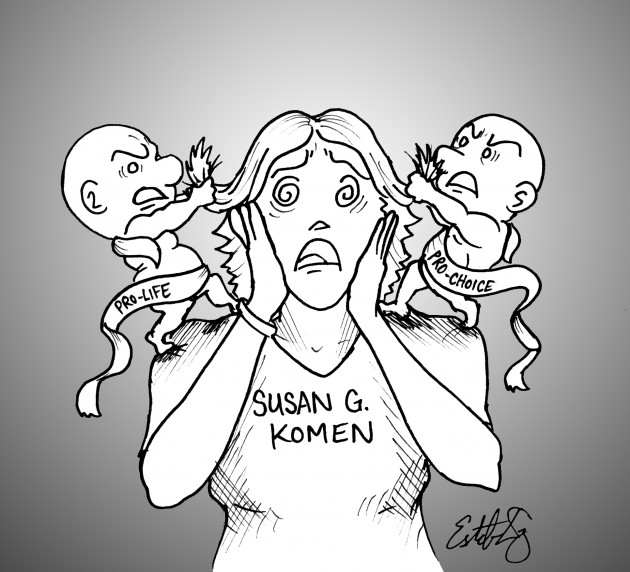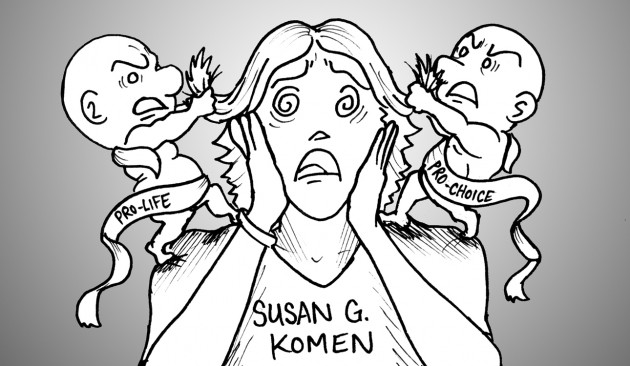
Susan G. Komen for the Cure is known for breast cancer awareness walks and pink versions of almost every product. Its most recent foray into the public eye, however, has been much less positive.
On Jan. 31, the breast cancer charity’s decision to stop grants to Planned Parenthood was made public, and the news quickly went viral.
Planned Parenthood expressed disappointment for a move it viewed as motivated by political pressure from pro-life activists, a view at least one Komen board member did not deny. As the New York Times reports, Komen was attempting (unsuccessfully) to end a relationship with a controversial group that was negatively impacting donations and support.
What Komen did not consider, however, was that bowing to pressure from one side would result in a negative backlash from the other side.
According to the New York Times, “by the end of the week, Twitter users had sent more than 1.3 million posts mentioning Planned Parenthood, the Susan G. Komen for the Cure foundation and related terms and hashtags. On Thursday alone, there were more than 460,000 Tweets.” Facebook also saw an increase in posts about the foundation and its decision, with reactions ranging from approval to disgust.
Komen spokeswoman Leslie Aun said the decision was a result of a new policy forbidding grants to groups under investigation by local, state or federal authorities. Planned Parenthood is currently the subject of an inquiry into allegations of the use of public funds for abortions, instigated by Rep. Cliff Stearns, R-Fla. Supporters consider the investigation to be politically motivated and illegitimate.
After an overwhelmingly negative response from social media sites, Capitol Hill and within the Komen foundation itself, Nancy Brinker, the founder of Komen, reversed the decision. “We want to apologize to the American public for recent decisions that cast doubt upon our commitment to our mission of saving women’s lives,” Brinkley said in a statement.
What casts doubt on Komen’s commitment is its focus on political pressure rather than its mission. Yes, political savvy is an important aspect of any major fundraising group, but Komen has built a strong reputation as a breast cancer fundraising and support group and make those efforts the priority.
If board members felt strongly about needing to sever ties with Planned Parenthood due to supporters’ feedback, they should have publicly announced their decision and been honest about the end of the relationship. Instead, Komen made a rule about investigations that only applied to Planned Parenthood, and then attempted to keep the effects of that rule secret for over a month.
Komen has played the victim in this situation, publicly bemoaning its position between pro-life and pro-choice supporters. “Is it possible for a woman’s health organization to stay out of the abortion issue and help all women?” asked John D. Raffaelli, a Komen board member. “I don’t know the answer to that yet. What we were doing before was angering the right-to-life crowd. Then, with our decision in December, we upset the pro-choice crowd. And now we’re going to make the right-to-life crowd mad all over again. How do we stop doing that?”
The answer lies in transparent dealings with all partners and to make clear to supporters what Komen grants are funding. Pro-life men and women are notorious for their hatred of Planned Parenthood, but Komen’s support of the organization allowed for mammogram vouchers for low-income women. These vouchers are not a pro-life or pro-choice issue. They are a public health and poverty issue.
Money raised for Komen was not being funneled to abortions. It was being used to allow women without health insurance or disposable income to have breast cancer screening opportunities, which have saved many lives. If the board felt supporters needed a way to feel more comfortable giving money without supporting Planned Parenthood, they could have looked into a provision included on donation forms. That could allow the donors to say their money can only be used for research or some other caveat to sidestep the issue.
As the premier breast cancer awareness organization, Komen owes it to women everywhere to focus solely on breast cancer. If the foundation decides to expand to a broader definition of women’s rights, then they can fight the pro-life, pro-choice battle at that time.
Until then, it would behoove Komen, and all other foundations on precarious political ground, to stick to what they know and work to educate rather than react. By flip-flopping over funding, Komen managed to anger both pro-life and pro-choice supporters in the same week. Hopefully the weeks to come are better.



